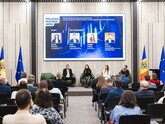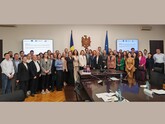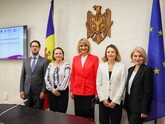
A skilled workforce remains the key factor in attracting investors, and we must make every effort to develop and retain this talent, says Marin Ciobanu
During a meeting of the Economic Press Club, Marin Ciobanu, President of the Association of Employers in the Manufacturing Industry (APIP), noted that the competencies provided by vocational schools, colleges, and universities are insufficient to train a skilled workforce, and that the Moldovan curriculum does not cover a wide range of areas. To address this gap, APIP is promoting specialist training for existing and potential clients through the Tech Zone, organizing short-term courses in highly specialized fields; partnerships with the National Employment Agency, the Ministry of Defense, and the German Agency for International Cooperation (GIZ); business incubators for startups through mentoring, networking, financing, access to technical infrastructure, offices, and production facilities; and implementing programs like Train the Trainer, aimed at training teachers and vocational school instructors. Construction of a training platform for specializations in electronics, computer engineering, electronic manufacturing, and design has also begun in partnership with the Austrian Technical College in Straseni. "The academic year has already begun, and two groups have been enrolled, with instruction in English and German, and some in Romanian. Similar institutions are successfully operating in other countries. For example, in Albania, after training specialists using this system, it was possible to attract hundreds of companies with German, Swiss, and Austrian capital," noted Marin Ciobanu. He also announced that business incubators will operate at the college, providing young people who complete the courses with the opportunity to try their hand at starting businesses. They will receive $10,000 in financial assistance, mentoring support, and access to equipment so they can apply their skills in practice. Another initiative modeled by APIP is the TUMO platform—informal platforms that provide free training in fields such as programming, robotics, engineering, design, animation, and web development. Through interactive workshops, mentoring, and collaboration, these specialists can be trained while still in school. In the EU, for example, this program has reached over 60,000 teenagers. Marin Ciobanu also emphasized the importance of continuing to support the training of specialists through the dual system. // 23.09.2025 — InfoMarket.







